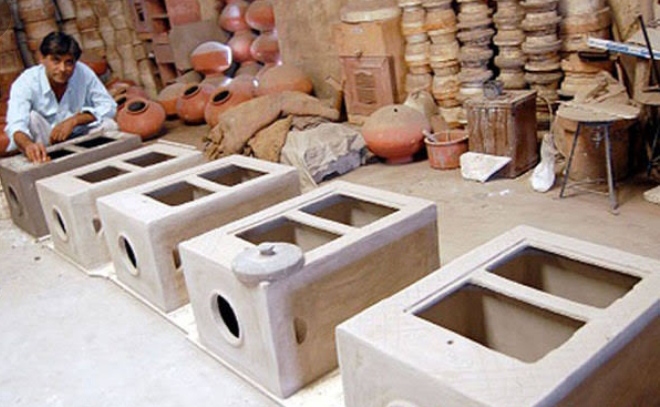An estimated 90% of India’s ceramic products come from the state of Gujarat, but the industry has struggled in recent years. First companies started replacing workers with machines leaving many ceramicists without jobs. Then weakened demand forced many factories to pass production or shut down completely. This company has stayed afloat but it hasn’t been easy. In order to keep them engaged the owner combined traditional handmade techniques with machinery, then he set out to tackle a big problem. Many of his customers don’t have regular access to electricity. So, he designed appliances completely out of clay like refrigerators and pressure cookers that didn’t need electric power to work, and they are quite affordable.
The process starts with the clay; it’s sourced domestically within India or melted from old ceramic. A machine does the melting; it’s called a boil mill. After 12 hours they get a liquid clay that needs to be thickened with dry powdered ceramics. It’s then churned with a plunger to stop the clay from settling. Once it’s time to use the clay, it is pumped into this big metal container and workers pour natural dye for a uniform colour.
But to make pots artisans use this wheel much of this work is still done the way it’s always been done by hand. They carefully join the top and bottom pieces of the pot together. It takes a lot of skill but an experienced artisan can finish a piece in minutes. Once an item is properly moulded it goes into a temperature. With very little heat the ceramic will not harden, and it will crack if there is too much heat. It takes six hours for the items to harden completely.
Starting from the mid 90’s under industrialization, it has swept Gujarat’s ceramic industry. Machines took over most of the production process and it left most artisans without work. It took four years to finalise the design for the Mitticool refrigerator. It can keep perishable food cool for up to a week and it never needs electricity. This fridge cost forty dollars, about one third the price of an electric one. In the past year online sales have jumped and the company employs 150 people mostly women. Mansoog pai( the owner) tripled his current portfolio of 350 products to include handmade titles, exterior products and murals.


Air India Unveils Dynamic New Look: Balancing Legacy and Modernity